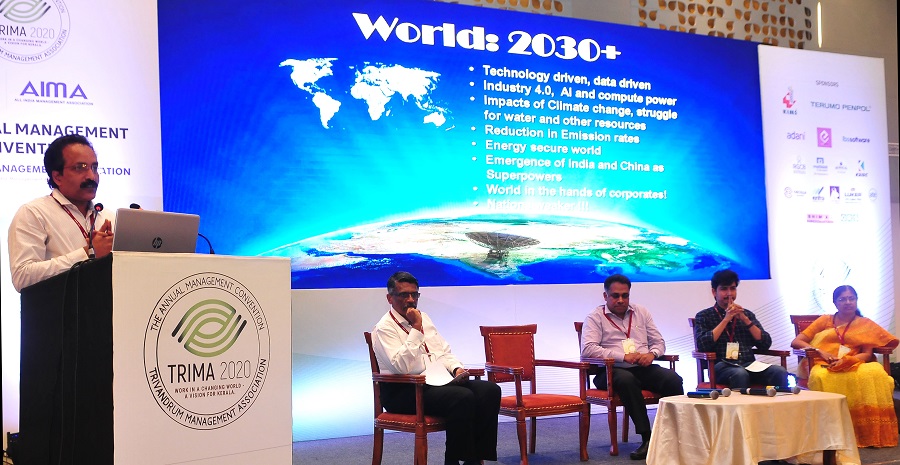

THIRUVANANTHAPURAM:
Startups are going to play a bigger role in the production of space systems in the industry 4.0 as exploring commercial opportunities for Indian space sector will be crucial by 2050, Dr S Somnath, Director, Vikram Sarabhai Space Centre (VSSC), said here today.
“Production of rockets through Indian industry will be one of the key changes in 2050. Commercialisation of Indian launch vehicle and satellite capacity will happen in the Industry 4.0 scenario,” he said, while delivering the keynote address on “Industry 4.0 – Impact on Jobs”, at TRIMA 2020, the annual convention of Trivandrum Management Association (TMA).
Industry 4.0 is the trend towards automation and data exchange in manufacturing technologies and processes, the Internet of Things (IoT), industrial internet of things (IIOT), cloud computing, cognitive computing and Artificial Intelligence. About 35 startups have already come up in space sector, three of them focused on designing of rockets, 14 in InDesigning satellites and the rest in drone-based applications and services sector.
“These startups have often approached ISRO with their prototypes for testing and evaluation. I can’t predict if they are going to be successful in terms of making rockets and launching them. But I wish them success,” he said.
The vital question before ISRO is if such an important task needs to be handed over to private sector and enable them to handle it, Dr. Somnath said, adding that the space organisation is looking at big companies which are willing to take up the job in terms of manufacturing and supporting the startups.
Foreign firms like Airbus are discussing the possibilities of coming to India and set up their plants, which is another change that is going to happen in the space sector, the VSSC director noted.
G. Vijayaraghavan, Founder-CEO, Technopark, who was the moderator of the debate, observed that “the pace at which the jobs are changed is going to be ten times of the jobs changed in the last 10 years.”
Dr Saji Gopinath, CEO, Kerala Startup Mission (KSUM), said acquiring special skills and knowledge in the job sector is important while the world shifts to Industry 4.0. Radhakrishnan Nair, Co-founder and CEO, Smart IOPS, Inc-San Francisco, US, stressed the importance of building ability to adapt to the new job milieu.
Sudhamony S, Chief Consultant, eHealth Kerala Project, Department of Health, said healthcare is one of the socially impactable sectors in the Industry 4.0 revolution.
Speakers at a session on “Able to Capable—Upskill” said the fast-paced changes called for greater synergy between industry and academia to ensure that existing and future workforce across sectors are provided with skill sets to meet multiple challenges awaiting them.
Setting the context, K M Subhash, Founder & CEO, Trinity Skillworks, said that in today’s integrated and interconnected world, no one can remain an isolated island unaffected by the profound transformations taking place. “Like in the previous industrial revolutions, this one too will lead to greater productivity and conveniences but the basic question is what we are going to do to face the scenario.
Jatin Trivedi, Head, Adani Skill Development Centre, said, “It is important to accept the changes and integrate them to our education system. First of all, we have to learn how to learn. Unfortunately, today the system in the country is not as strong as it should be,” he observed.
Alexander Verghese, COO, UST Global, said there has to be a lot of collaboration among industry, industrial bodies, governments and academia to live up to the challenges thrown up by the unfolding scenario.
Emphasising that upskilling of the existing workforce, Kripesh Hariharan, Global Head HR, KIMS Healthcare Management, said healthcare is one of the vital domains where the changes have started making impact. “Hospitals are becoming hospitality centres and patients guests,” he added.
Sekharan Y Menon, CEO, Edge Varsity Learning Systems Pvt Ltd, said unfortunately India’s higher education system has been a failure in equipping the students capable of taking head on the jobs awaiting them outside the campuses. “This does not mean that our youngsters are not intelligent enough. Only that our system did not provide the kind of knowledge (they require), especially on the application side,” he added.
Over 200 delegates, including industry leaders, management experts, administrators and startup promoters, are attending TRIMA 2020, the annual flagship event of TMA, which began on Thursday. The central theme of the meet is “Work in a changing world—a vision for Kerala”.
more recommended stories
THIRUVANANTHAPURAM:Kerala Industrial Infrastructure Development Corporation (KINFRA).
THIRUVANANTHAPURAM:The State Budget for 2026-27, presented.
KOCHI:The Kerala Startup Mission (KSUM) has.
KOCHI:Cochin International Airport Limited, in collaboration.
KOLLAM:With multiple infrastructure projects underway, improved.
KOCHI:Scaling up its overseas market, Kerala.
THIRUVANANTHAPURAM:The hugely successful Adopt-a-Village programme spearheaded.
THIRUVANANTHAPURAM:Leading Robotics Process Automation (RPA) and.
KOCHI:“Kerala has evolved as an ideal.
MUMBAI:Bharat Petroleum Corporation Limited (BPCL), a.